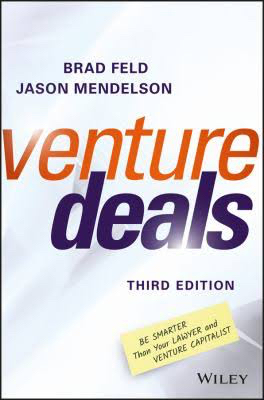
My book this week is Venture Deals by Brad Feld and Jason Mendelson. The most valuable lessons from this book to me are demystifying the funding process, sharing the “secrets” about the venture capital industry in a plain and clear way, and providing many very concrete recommendations on what matters more and what does not deserve much energy dwelling on. The return on the investment of purchasing this book and reading it would be immense, if creating a startup is one’s plan.
Brad and Jason have decades of combined experience in the venture industry. I also infer from the writing that they have different strengths. This book is a great piece of collaboration between them, with the entrepreneur’s perspective contributed by Matt Blumberg. Matt’s perspectives are insightful and direct in conveying what the content covered in each section would mean to an entrepreneur or one to be. I appreciate that the authors share with us many real examples and great advice on handling numerous scenarios. It is impressively informative. During the last few days we experienced an extreme heat wave around Sand Hill, broadly the whole bay and peninsula area. It would have been much more miserable, if not for the pleasure of reading this book.
The book explains the language of the venture industry. This serves as a great reference book to novice entrepreneurs and to those who want to be. It is centered on the economy and on control. First, covering the process of raising fund, how to, who to target, and what to expect as a typical process. Second, dedicating a great amount of writing to the term sheet, perhaps the most critical component if seeking venture funding. Third, explaining the capitalisation table, the pros and cons of using convertible debt. It also has a chapter talking about the recent phenomenon of crowdfunding. The chapter on How Venture Capital Funds Work helps the entrepreneurs to get the perspective from the other side of the table and know how to cooperate or leverage on that knowledge. The chapter on Letters of Intent informatively explains the potential acquisition stage.
Many insights from this book are applicable not only when you try to raise fund for your business endeavor, but also in many other professional and personal scenarios, especially the chapter on negotiation tactics. This book shows that being a good entrepreneur requires a varied set of skills. Although one can aim to develop as much as one possibly can, having partners to work together as a team through the journey potentially would stand much more chance to succeed, barring the numerous cases where the team has severe frictions and falls apart.
Below I select a couple of instances of specific advice among the many from the book.
On negotiation:
There are only three things that matter when negotiating a financing: achieving a good and fair result, not killing your personal relationship getting there, and understanding the deal that you are striking….Pick a few things that really matter – the valuation, stock option pool, liquidation preferences, board and voting controls – and be done with it….When you are going to negotiate your financing, have a plan. Have key things that you want, understand which terms you are willing to concede, and know when you are willing to walk away. If you try to determine this during the negotiation, your emotions are likely to get the best of you and you’ll make mistakes. Always have a plan.
Having an open and collaborative approach with your VC in the context of an acquisition…Being clear with your investors about what is important to you and your team early in the negotiation can help set a tone where you and your investors are working together to reach the right deal structure, especially when the acquirer is trying to drive a wedge between you and those investors. A negotiation in a state of plenty is much easier than a negotiation in a state of scarcity.
On raising money the right way:
Don’t be a machine. Be Human. Be yourself, let us get to know you, and become inspired by you. As the average length of relationship between a VC and entrepreneur lasts longer than the average U.S. marriage, this is a long-term commitment.
The authors’ advice on patents is very pertinent to me, as I had worked on filing a bunch and perhaps overemphasized the value of patents.
When you are working on software, realize that patents are, at best, defensive weapons for others coming after you. Creating a successful software business is about having a great idea and executing well, not about patents, in our opinion.
The authors recommend “The Entrepreneur’s Guide to Business Law” by Constance Bagley and Craig Dauchy as the best book ever written on legal issues for entrepreneurs. I shall append it to my list of books to read for 2018.